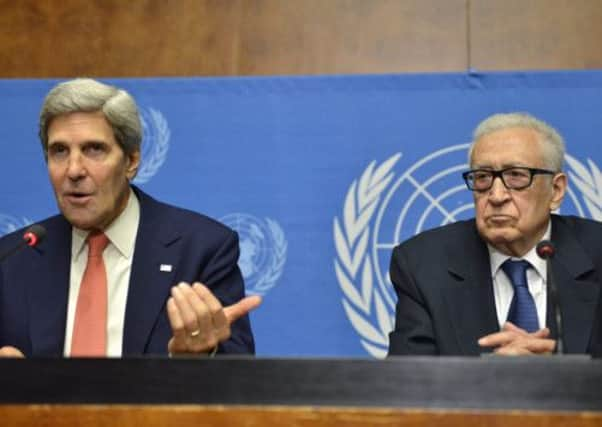US and Russia united over fresh Syria drive


US Secretary of State John Kerry and Russian foreign minister Sergei Lavrov met to work on Moscow’s disarmament proposal. However, Washington remains sceptical and Mr Kerry has said US military action is still possible to punish Mr Assad for a poison gas attack in rebel territory last month.
United Nations Secretary-General Ban Ki-moon said last night that a report by UN chemical weapons experts would confirm that poison gas was used in that attack.
Advertisement
Hide AdAdvertisement
Hide Ad“I believe that the report will be an overwhelming report that chemical weapons [were] used even though I cannot publicly say at this time before I receive this report,” Mr Ban said at a UN meeting in New York.
Mr Ban also said Mr Assad “has committed many crimes against humanity”, though he did not say whether it was Assad forces or rebels who used chemical toxins in the 21 August attack.
The US has blamed Mr Assad’s government for the attack, while Russia and the Assad regime say it was the work of rebel forces.
On the second day of their talks in Geneva, Mr Kerry and Mr Lavrov said progress on the chemical arms issue could help relaunch their efforts to bring Syria’s warring sides together and negotiate an end to a conflict that has inflamed the Middle East and divided world powers since it began in 2011.
There is little sign of compromise inside Syria, however, where sectarian and ethnic hatreds have been deepened by two and a half years of war that has killed over 100,000 people and forced up to a third of the population from their homes.
Air strikes and artillery bombardments on rebel-held suburbs of the Syrian capital yesterday followed defiant comments from Mr Assad a day earlier after he agreed, with prompting from Russian, to sign up to a global ban on chemical weapons.
Mr Kerry told a joint news conference: “We are committed to trying to work together, beginning with this initiative on the chemical weapons, in hopes that those efforts could pay off and bring peace and stability to a war-torn part of the world.”
He hoped a date might be set for peace talks, but added: “Much will depend on the capacity to have success here in the next hours, days, on the subject of the chemical weapons.”
Advertisement
Hide AdAdvertisement
Hide AdTalks with Mr Lavrov, which also involved US and Russian weapons experts, are expected to last until today in Geneva.
After meeting UN envoy Lakhdar Brahimi, Mr Lavrov and Mr Kerry said they hoped to meet in New York in two weeks to see if they could schedule a new peace conference on Syria.
Mr Lavrov, voicing regret at the failure of an international accord reached at Geneva last year, said he hoped a “Geneva 2” meeting could lead to a political settlement for Syria. “We agreed to see where we are and see what the Syrian parties think about it and do about it,” he said.
Russia has resisted calls from Syrian rebels and Western and Arab leaders for Mr Assad to make way for a transitional government.
Mr Assad’s Syrian opponents, many of them disheartened by the failure of US President Barack Obama to make good threats to launch military strikes in response to the August gas attack, say they see no place for Mr Assad after the war.
However, neither side has been able to finish the fighting, leaving the country’s territory divided and its people in misery, including two million who are now refugees abroad.
Executions
An international human rights group has accused Syrian government forces and pro-regime militias of carrying out summary executions earlier this year that left at least 248 people dead in two predominantly Sunni Muslim towns along the Mediterranean coast.
New York-based Human Rights Watch said in its new report, released yesterday, that mass killings took place in the towns of Bayda and Banias on 2 and 3 May.
Advertisement
Hide AdAdvertisement
Hide AdIt said the report was based on accounts of people and witnesses who saw or heard government and
pro-government forces detain and then kill their relatives.
The group’s activists have compiled a list of names of 167 people killed in Bayda and 81 in Banias.